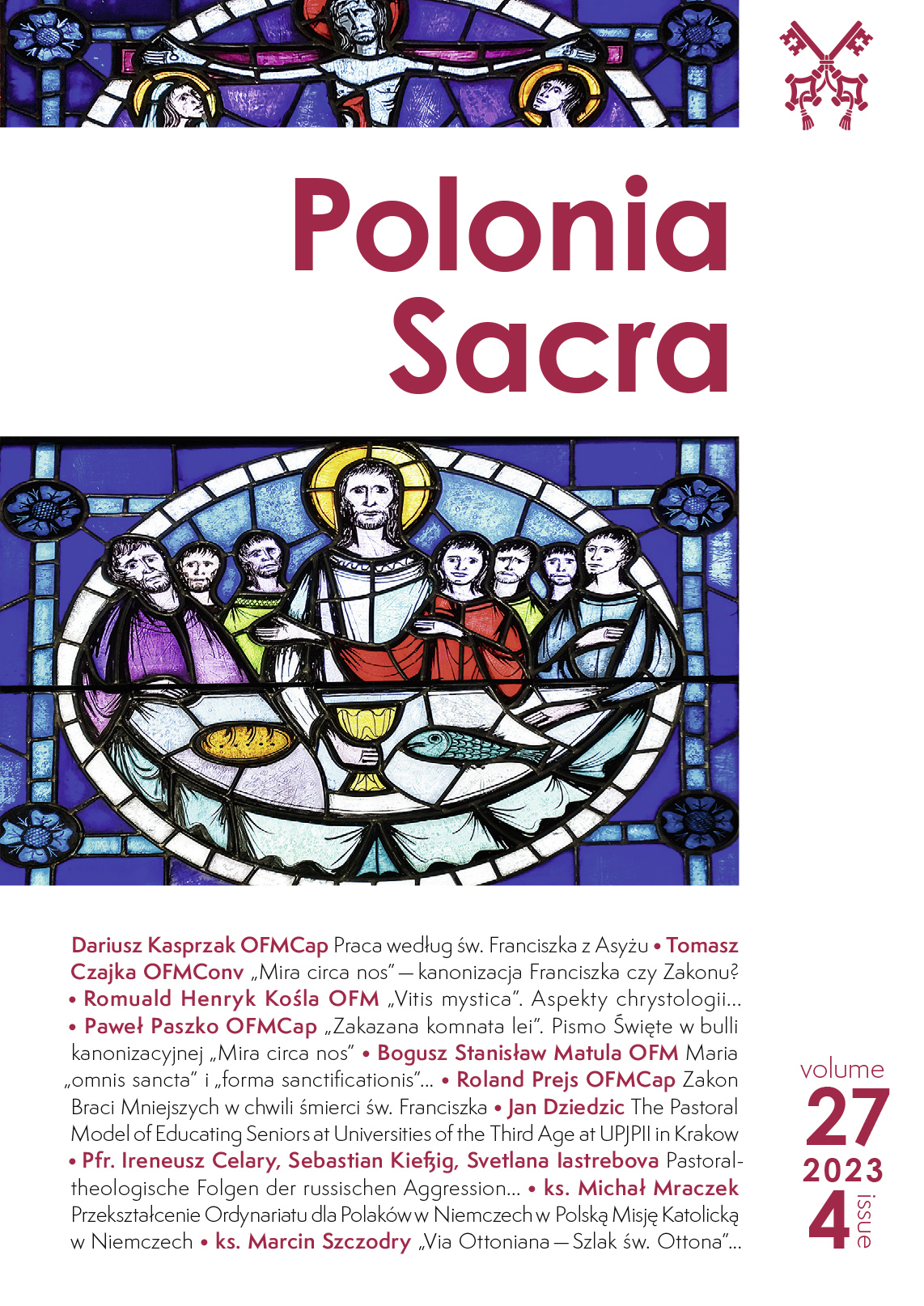Work According to St. Francis of Assisi
DOI:
https://doi.org/10.15633/ps.27401Keywords:
Francis of Assisi, work, motivation to work, pay, free workAbstract
In the article, the author theologically reconstructs the understanding of work as seen by Francis of Assisi. He does this by using the historical method of direct fact-finding and the theological method of reflecting on Poverello’s spiritual experience as recorded in the first two Franciscan rules, the writings of the first hagiographers of the Poverello, and the texts of Francis’ recognized commentators. The issue described is covered in four paragraphs: (1) Work understood as God’s grace; (2) Motivation to work; (3) Remuneration for work; (4) Gratuity of work.
References
AA. VV., „La grazia di lavorare”. Lavoro, vita consacrata, francescanesimo, a cura di P. Martinelli, M. Melone, Bologna 2015.
Anioł Clareno, Wykład Reguły Braci Mniejszych, w: Antologia mistyków franciszkańskich, t. 5: Wiek XIV, tłum. S. Kafel, Kraków 1990, s. 68–82.
Bellomo M., Il lavoro nel pensiero dei giuristi medievali: Proposte per una ricerca, w: Lavorare nel Medio Evo. Atti del XXI Convegno Storico Internazionale „Lavorare nel Medio Evo: Rappresentazioni ed esempli dall’ Italia dei secc. X–XIV”, Todi, 12–15 Ottobre 1980, Università di Periugia, Accademia Tudertina, Centro di Studi sulla spiritualità medievale, Perugia 1983, s. 171–197.
Bertinato P., Praca, w: Leksykon duchowości franciszkańskiej, przekł. i oprac. zbiorowe, red. E. Kumka, Kraków–Warszawa 2016, s. 1453–1464.
Block W., „Reguła i życie tych braci”. 800-lecie powstania „Reguły niezatwierdzonej” (1221–2021), „Studia Franciszkańskie” 31 (2021), s. 19–50.
Block W., Bulla Solet annuere papieża Honoriusza III (1223) i bulla Solet annuere papieża Innocentego IV (1253). Krytyczna analiza treści obu dokumentów, w: Forma sororum, red. Z. Styś, M. Sykuła, G. Filipiuk, J. Wojas, Warszawa–Kraków 2012, s. 147–181.
Bonaventura de Bagnoregio, Opusculum XVI. Expositio super regulam Fratrum Minorum, w: S. Bonaventurae Opera Omnia, t. 8, Quaracchi 1898, s. 391–437.
Bukała M., Etyka ekonomiczna średniowiecza, „Etyka” 37 (2004), s. 85–101.
Ceccobao S., La „Regola non Bollata” il fermento della vita che diventa norma, „Laurentianum” 62 (2021), s. 311–327.
Cusato M. F., Caesar of Speyer: redactor, author, exegete, polemicist, „Laurentianum” 62 (2021) nr 3, s. 257–310.
Esser K., Melius Catholice Observemus. Objaśnienia Reguły w świetle pism i wypowiedzi św. Franciszka, w: L. Hardick, J. Terschlüsen, K. Esser, Franciszkańska Reguła życia, przekł. K. Ponurek, Niepokalanów 1988, s. 93–177.
Evangelisti P., „Vide igitur, quid sentire debeas de receptione pecuniae”. Il denaro francescano tra norma ed interpretazione (1223–1390), Spoleto 2019.
Fleischacker S. S., Adam Smith’s Moral and Political Philosophy, https://plato.stanford.edu/entries/smith-moral-political/ (06.07.2020).
Fossier R., Ludzie średniowiecza, tłum. A. Czupa, Kraków 2009.
Freyer J. B., Il lavoro secondo gli scritti di s. Francesco, w: La grazia delle origini. Studi in occasione dell’VIII centenario dell’approvazione della prima regola di san Francesco d’Assisi (1209–2009), a cura di P. Martinelli, Bologna 2009, s. 199–207.
Horowski A., La „Regula non Bullata”: dal silenzio di Tommaso da Celano al racconto di Bonaventura e alle complicazioni francescane del trecento, „Laurentianum” 62 (2021) nr 3, s. 329–356.
Horowski A., Reguła Braci Mniejszych, jej powstanie i zatwierdzenie w dziełach hagiograficznych i w kazaniach św. Bonawentury, „Polonia Sacra” 23 (2019) nr 2, s. 5–26.
Le Goff J., Średniowiecze i pieniądze. Esej z antropologii historycznej, tłum. B. Baran, Warszawa 2022.
Meuvvret J., Circulation monétaire et utilisation économique de la monnaie dans la France du XVIe au XVIIe siècle, „Études d’histoire moderne et contemporaine” 1 (1947), s. 15–28.
Paolazzi C., La „Regula non bullata” dei Frati Minori (1221), dallo stemma codicum al testo critico, „Archivum Franciscanum historicum” 100 (2007) nr 1–2, s. 5–148.
Pellegrini L., La grazia del lavoro, w: La regola di frate Francesco. Eredità e sfida, a cura di P. Maranesi, F. Acrocca, Padova 2012, s. 351–370.
Riber M., Praca w Biblii, tłum. Z. Zwolska, Warszawa 1979.
Romaniuk K., Błogosławieństwo czy przekleństwo? Praca w Piśmie Świętym, Katowice 1997.
Rusconi R., La formulazione delle regole minoritiche nel primo quarto del secolo XIII, w: R. Rusconi, Studi francescani, Spoleto 2021, s. 185–206 (Medioevo francescano. Saggi, 22).
Słomka J., Metodologia teologii duchowości, „Śląskie Studia Historyczno-Teologiczne” 50 (2017) nr 1, s. 129–142.
Sobór Laterański IV, Konstytucje, w: Dokumenty soborów powszechnych: tekst grecki, łaciński, polski, t. 2 (869–1312), układ i oprac. A. Baron, H. Pietras, Kraków 2002, s. 220–325 (Źródła Myśli Teologicznej, 26).
Święci Franciszek i Klara z Asyżu, Pisma, wydanie łacińsko-polskie, przekł. K. Ambrożkiewicz, red. wyd. pol. W. Michalczyk, Kraków–Warszawa 2002 (Źródła Chrześcijańskie).
Teoria e pratica del lavoro nel monachesimo altomedievale. Atti del Convegno internazionale di studio, Roma–Subiaco, 7–9 giugno 2013, a cura di L. Ermini Pani, Spoletto 2015 (De Re Monastica, 4).
Terschlüsen J., Reguła franciszkańska w świetle prawomocnych orzeczeń papieskich, w: L. Hardick, J. Terschlüsen, K. Esser, Franciszkańska Reguła życia, przekł. K. Ponurek, Niepokalanów 1988, s. 69–92.
Tomasza z Celano biografie św. Franciszka: Żywot pierwszy. Żywot drugi. Traktat o cudach. Legenda do czytania w chórze, przekł. zespół redakcyjny pod kierunkiem R. Witkowskiego, Poznań–Warszawa 2007 (Źródła Franciszkańskie (XIII–XIV w.), 3).
Weinstein J. R., Adam Smith (1723–1790), w: Internet Encyclopedia of Philosophy, https://iep.utm.edu/smith/ (06.07.2020).
Downloads
Published
Issue
Section
License
Copyright (c) 2023 Dariusz Kasprzak

This work is licensed under a Creative Commons Attribution 4.0 International License.
Authors who publish in this journal agree to the following terms:
- Authors retain the copyright and full publishing rights without restrictions and grant the journal right of first publication with the work simultaneously licensed under a Creative Commons Attribution 4.0 International License that allows others to share the work with an acknowledgement of the work's authorship and initial publication in this journal.
- Authors are able to enter into separate, additional contractual arrangements for the non-exclusive distribution of the journal's published version of the work (e.g., post it to an institutional repository or publish it in a book), with an acknowledgement of its initial publication in this journal.
- Authors are permitted and encouraged to post their work online (e.g., in institutional repositories or on their website) prior to and during the submission process, as this can lead to productive exchanges, as well as earlier and greater citation of published work (See The Effect of Open Access).

